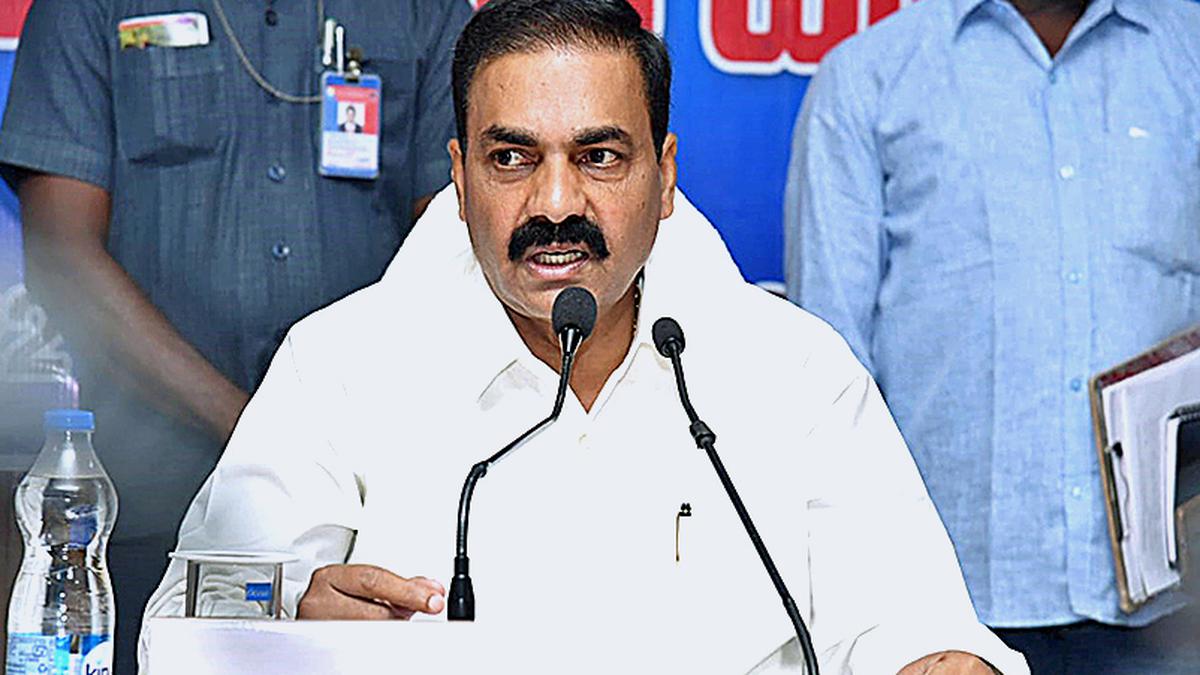
Agri sector saw unprecedented progress under YSRCP, says Kakani
The Hindu
The agriculture sector in Andhra Pradesh has witnessed unprecedented progress during the last four years, and the proactive steps taken by the State government have helped the sector to flourish like never before, said Agriculture Minister Kakani Govardhan Reddy.
The agriculture sector in Andhra Pradesh has witnessed unprecedented progress during the last four years, and the proactive steps taken by the State government have helped the sector to flourish like never before, said Agriculture Minister Kakani Govardhan Reddy.
On the eve of Rythu Dinotsavam, the Minister, speaking to The Hindu over phone on Friday, claimed that the agriculture sector reported a negative growth of -6.5% under the TDP regime in the State, as compared to a growth rate of 8.20% in 2021-22 under the YSRCP.
“The production of food grains witnessed a 13% growth from 149.56 lakh tonnes in 2018-19 to 169.3 lakh tonnes in 2022-23. Andhra Pradesh has emerged as a leader in the country’s agribusiness industry with exports worth ₹44,539 crore ($5.59 billion), showcasing a notable growth rate of 5.95% during 2021-22. Also, initiatives such as commodity-based food parks in Krishna, Guntur, Nellore and Chittoor districts with a capacity of 15 MT food grains and 18 MT fruit have boosted the exports for agri and food processing by 5.95% during the 2021-22 financial year, Mr. Govardhan Reddy said.
“The YSRCP government fulfilled almost all of its promises related to the farm sector. No previous dispensation has done anything comparable to ours. Introduction of Rythu Bharosa, Sunna Vaddi Panta Runalu, free crop insurance, nine hours of free power supply, and Rythu Bharosa Kendras (RBKs) are some of the highlights. The RBKs benefited 52 lakh farmers with an aid of ₹27,062 crore. Also, Sunna Vaddi Runalu provided investment support to 17 lakh farmers with an aid of ₹1,834 crore. As of December 2022, the government spent ₹7,700 crore to provide free power to 18 lakh farmers,” he said.
Elaborating on the objective of RBKs, which he said have not only won international awards, but have also become role models for other States, Mr. Govardhan Reddy said that the e-crop system, agriculture produce procurement, input subsidy in the same cropping session, and fee crop insurance schemes are also being studied as models by other States. The government implemented drip irrigation schemes worth ₹2,079 crore. This includes clearing of dues kept pending during TDP rule to the tune of ₹900 crore, he added.
The State government will organise Rythu Dinotsavam on Saturday on the occasion of former Chief Minister Y.S. Rajasekhara Reddy’s birth anniversary, rededicating itself to the development of agriculture sector in the State, he said.

“Writing, in general, is a very solitary process,” says Yauvanika Chopra, Associate Director at The New India Foundation (NIF), which, earlier this year, announced the 12th edition of its NIF Book Fellowships for research and scholarship about Indian history after Independence. While authors, in general, are built for it, it can still get very lonely, says Chopra, pointing out that the fellowship’s community support is as valuable as the monetary benefits it offers. “There is a solid community of NIF fellows, trustees, language experts, jury members, all of whom are incredibly competent,” she says. “They really help make authors feel supported from manuscript to publication, so you never feel like you’re struggling through isolation.”

Several principals of government and private schools in Delhi on Tuesday said the Directorate of Education (DoE) circular from a day earlier, directing schools to conduct classes in ‘hybrid’ mode, had caused confusion regarding day-to-day operations as they did not know how many students would return to school from Wednesday and how would teachers instruct in two modes — online and in person — at once. The DoE circular on Monday had also stated that the option to “exercise online mode of education, wherever available, shall vest with the students and their guardians”. Several schoolteachers also expressed confusion regarding the DoE order. A government schoolteacher said he was unsure of how to cope with the resumption of physical classes, given that the order directing government offices to ensure that 50% of the employees work from home is still in place. On Monday, the Commission for Air Quality Management in the National Capital Region and Adjoining Areas (CAQM) had, on the orders of the Supreme Court, directed schools in Delhi-NCR to shift classes to the hybrid mode, following which the DoE had issued the circular. The court had urged the Centre’s pollution watchdog to consider restarting physical classes due to many students missing out on the mid-day meals and lacking the necessary means to attend classes online. The CAQM had, on November 20, asked schools in Delhi-NCR to shift to the online mode of teaching.









